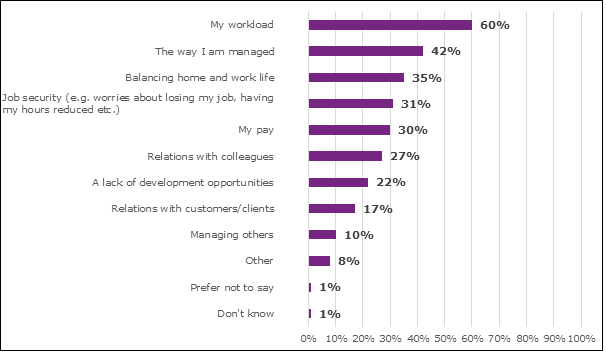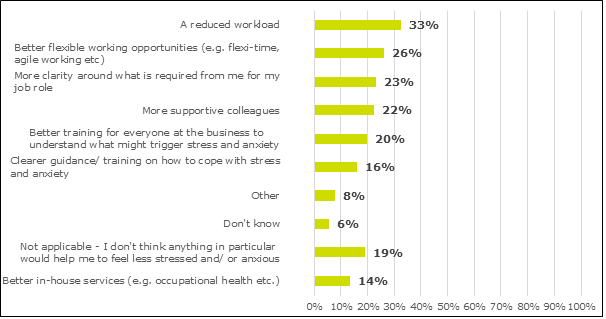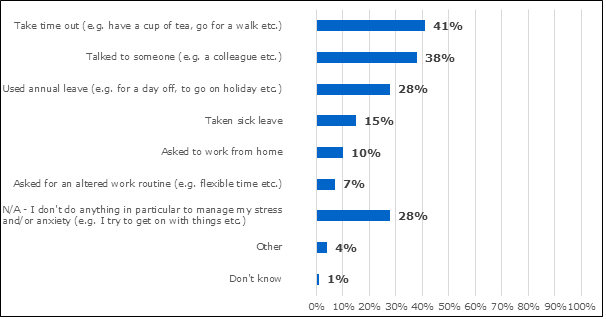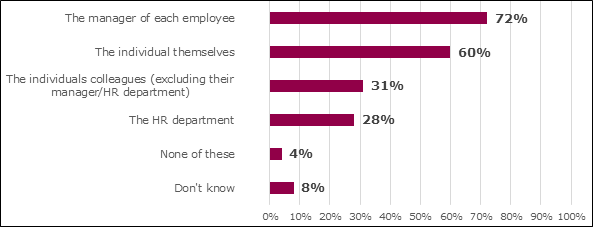Introduction and key findings
In October 2017, the government published its review of mental health and employers, 'Thriving at work' (PDF, 1MB, 84 pages). The authors, Lord Dennis Stevenson and Paul Farmer, set out what they described as a 'wholly realistic' vision that by 2027, “employees in all types of employment will have 'good work', which contributes positively to their mental health, our society and our economy”. Achieving this vision of mental health at work, they believe, is based upon having the right tools, raising awareness and building confidence.
In September 2018, Acas published a 'Framework for Positive Mental Health at Work' (PDF, 343KB, 4 pages) which reflects both the 'core' and 'enhanced mental health standards' set out in the Stevenson/Farmer review. This includes the importance of 'good working conditions', 'effective people management', and 'open conversations about mental health'. It is Acas’ experience that delivering complex and cultural changes requires an approach built on the engagement of all workplace players. Our framework reflects this with its emphasis on making mental health a shared responsibility, involving employers, managers and individuals.
Against this backdrop of a high-level vision for mental health, Acas commissioned a YouGov poll to find out more about individuals’ current experience of mental wellbeing at work, specifically what are the causes and reactions to stress and anxiety in the workplace.
Key findings
-
two-thirds of employees (66%) have felt stressed and/or anxious about work in the last 12 months, with particular variation by age – 76% for those under the age of 35, compared to 54% for those aged 55 and over
-
less than one in ten (8%) say their organisation is ‘very good’ at preventing employees from feeling stressed and/or anxious about work
-
the most commonly cited cause of stress and/or anxiety for employees is their workload (60%), followed by the way they are managed (42%) and balancing home and work life (35%)
-
employees who feel stressed tend to take time out to manage it, such as having a cup of tea or going for a walk (41%). More than a quarter (28%) don’t do anything, and the same proportion use annual leave, with far fewer (15%) opting to take sick leave
-
a third (33%) of employees think that ‘a reduced workload’ would help with feeling less stressed and/or anxious, followed by ‘better flexible working opportunities’ (26%) and ‘more clarity around what is required from me for my job role’ (23%)
-
less than half (43%) of employees would talk to their manager in the event of being stressed and/or anxious at work, and more than 1-in-5 (22%) would not talk to anyone at work
-
a large majority (72%) of employees think that it is a manager’s role to recognise and address stress and anxiety in the workplace; 60% said the same of an individual themselves; 31% think their colleagues; and 28% said HR
Data source
All figures, unless otherwise stated, are from YouGov Plc. Total sample size was 2,000 employed adults. Fieldwork was undertaken between 28 March to 8 April 2019. The survey was carried out online. The figures have been weighted and are representative of British business size.
Prevalence, causes and solutions
The Acas poll found that two-thirds (66%) of employees have felt stressed and/or anxious about work in the last 12 months. This chimes with many other recent surveys, such as the CIPD and Simplyhealth’s ‘Health and Wellbeing at Work’ report (2019), which states that 37% of organisations have seen an increase in stress-related absence, and nearly three-fifths an increase in the number of mental health conditions, such as anxiety and depression. Interestingly, our poll found that feeling stressed and/or anxious about work is more common in younger employees (76% under the age of 35) than older workers (54% aged 55 and over).
And at a time when the UK’s culture of long working hours seems to be dominating the headlines, the causes of stress identified in our poll are very familiar, with workload (60%), the way people are managed (42%) and balancing work and home life (35%) the chief culprits. Balancing work and home is especially a trigger for younger employees (42% of those under 44, compared to 31% of those aged 45 to 54 and 25% of over-55s).
Survey results: which, if any, of the following have caused you to feel stressed and/or anxious about work?

Many of these workplace problems were identified in earlier Acas research. ‘The Management of Mental Health at Work’ (2016) (PDF, 343KB, 88 pages) found that there are 3 workplace issues that present the greatest challenge to positive mental health in the workplace:
-
Organisational change: both in terms of how this is managed and how it is communicated to employees.
-
Downsizing and work intensification and the impact this is having on stress levels and work-life balance.
-
Line management capability to engage with staff when it comes to interpersonal interactions, particularly around performance management systems.
The issue of work intensification and line management capability emerge particularly strongly in our poll. Unsurprisingly, the possible solutions identified by employees very much mirror the reported causes: a third (33%) of all employees envisaged that 'a reduced workload' would help them feel less stressed and anxious, followed by 'better flexible working opportunities' (26%), 'more clarity around what is required from me for my job role' (23%) and 'more supportive colleagues' (22%).
Survey results: which, if any, of the following do you think would help you to feel less stressed/anxious?

A personal or shared responsibility?
Our poll found that the majority of employees (79%) are ‘very’ or ‘fairly confident’ in identifying the causes of what makes them feel stressed or anxious about work (rising to 90% when the 12% of employees who report never feeling stressed or anxious about work are excluded).
So who and what do they turn to in order to manage these feelings?
What employees do to cope on a personal level
The measures that employees who feel stressed take to help them cope with organisational stressors seem very personal and slightly prosaic, with the highest proportion (41%) taking time out, such as having a cup of tea or going for a walk, closely followed by talking to someone, for instance a colleague (38%). And while 15% go on sick leave, 28% take annual leave, and the same percentage ‘don’t do anything’ to cope with these feelings. This response may well reflect the severity of their stress and anxiety, rather than their personal coping strategies.
Who employees talk to at work about how they are feeling
Worryingly, less than half (43%) of all employees envisaged that they would talk to their manager in the event of being stressed and/or anxious at work. A similar percentage (42%) would talk to their colleagues, while more than 1-in-5 (22%) said that they would not talk to anyone at work.
Who employees feel should help them
Deal with the causes and symptoms of feeling stressed and/or anxious at work. Only 8% say their organisation is ‘very good’ at preventing employees from feeling stressed and/or anxious about work, despite some of the causes being organisational. The large majority (72%) think that it is a manager’s role to recognise and address stress and anxiety in the workplace; 60% said the same of an individual themselves; 31% think it is a role for their colleagues; and 28% said HR.
Survey results: which, if any, of the following have you done to manage your stress?

The pivotal role played by the line manager in wellbeing and pastoral care issues is nothing new. For example, it is echoed in preliminary findings from research by Sheffield University (2019) looking at how to support employees with mental health issues returning to work. But if 72% of employees feel that the line manager is at least partly responsible for addressing the causes of stress and anxiety, yet only 43% would actually talk to their line manager in the event of becoming stressed themselves, we clearly still have a confidence and skills gap in dealing with these personal issues.
Survey results: which, if any, of the following people's role do you think it is to recognise and address stress and feelings of anxiety at your workplace?

It is noticeable in our poll that very little responsibility for addressing the causes of stress is placed at the door of HR. Interestingly, however, there was huge variability by size, with medium-sized companies being more HR-reliant (42%) than the largest and smallest companies (29% and 21% respectively).
Although some of the causes are very much organisational issues – such as work intensification and investment in management training – the solutions seem to be found at a much more interpersonal level, in terms of talking to colleagues and hoping a line manager will spot something is wrong and intervene.
The fact that just over half (57%) of all employees have in the last 12 months personally asked a colleague how they are feeling, because they were concerned that they were stressed or anxious about work, is encouraging. It may reflect the progress being made to normalise conversations about our deeper sense of wellbeing. But are the deeper, organisational problems that cause people to feel stressed and/or anxious at work being addressed?
Health at work survey by YouGov
Question 1: Thinking about the last 12 months (since the end of March/beginning of April 2018), in general, have you felt stressed and/or anxious about work in the last 12 months?
|
Unweighted base |
2,000 |
| Base: all employees | 2,000 |
| Yes, I have | 66% |
| No, I have not | 31% |
| Do not know/ cannot recall | 2% |
| Prefer not to say | 0% |
Question 2: Thinking about the most recent time that you have felt stressed or anxious about work, how confident, if at all, are you that you could identify what it is about work that causes you to feel stressed or anxious about work?
|
Unweighted base |
2,000 |
|
Base: all employees |
2,000 |
|
Very confident |
32% |
|
Fairly confident |
47% |
|
Not very confident |
6% |
|
Not at all confident |
1% |
|
Do not know |
2% |
|
Not applicable - I never feel stressed or anxious about work |
12% |
| Net: very/fairly confident | 79% |
|
Net: Not confident |
7% |
Question 3: You said that you have felt stressed and/or anxious about work in the last 12 months (since the end of March/ beginning of April 2018), which, if any, of the following have caused you to feel stressed and/ or anxious about work? (Please select all that apply)
|
Unweighted base |
1,322 |
|
Base: all employees who have felt stressed or anxious in the last year |
1,316 |
|
Relations with colleagues |
27% |
|
The way I am managed |
42% |
|
Managing others |
10% |
|
Balancing home and work life |
35% |
|
Job security (worries about losing my job, having my hours reduced, etc) |
31% |
|
My pay |
30% |
|
A lack of development opportunities |
22% |
|
My workload |
60% |
|
Relations with customers/clients |
17% |
|
Other |
8% |
|
Do not know |
1% |
|
Prefer not to say |
1% |
|
Net: any specified |
96% |
Question 4: Thinking about when you ever feel stressed and/or anxious about work, which, if any, of the following have you done to manage your stress? (Please select all that apply)
|
Unweighted base |
1,758 |
|
Base: all employees who ever feel stressed about work |
1,752 |
|
Take time out (have a cup of tea, go for a walk, etc) |
41% |
|
Talked to someone (a colleague, etc) |
38% |
|
Taken sick leave |
15% |
|
Used annual leave (for a day off, to go on holiday, etc) |
28% |
|
Asked to work from home |
10% |
|
Asked for an altered work routine (flexible time, etc) |
7% |
|
Other |
4% |
|
Don't know |
1% |
|
Not applicable - I do not do anything in particular to manage my stress and/or anxiety (for example, I try to get on with things, etc) |
28% |
|
Net: any specified |
69% |
Question 5: For the following question, please imagine that you were feeling stressed and/ or anxious about work, which, if any, of the following do you think would help you to feel less stressed/ anxious? (Please select all that apply)
|
Unweighted base |
2,000 |
|
Base: all employees |
2,000 |
|
Clearer guidance/training on how to cope with stress and anxiety |
16% |
|
Better training for everyone at the business to understand what might trigger stress and anxiety |
20% |
|
More supportive colleagues |
22% |
|
Better in-house services (occupational health, etc) |
14% |
|
Better flexible working opportunities (flexi-time, agile working, etc) |
26% |
|
A reduced workload |
33% |
|
More clarity around what is required from me for my job role |
23% |
|
Other |
8% |
|
Don't know |
6% |
|
Not applicable - I do not think anything in particular would help me to feel less stressed and/ or anxious |
19% |
|
Net: any specified |
71% |
Question 6: Still imagining that you were feeling stressed and/ or anxious about work, which, if any, of the following people would you talk to about it at work? (Please select all that apply)
|
Unweighted base |
2,000 |
|
Base: all employees |
2,000 |
|
My manager |
43% |
|
A colleague (other than my manager or someone in HR) |
42% |
|
The HR department |
10% |
|
My union or employee representative |
6% |
|
A specialist support team at my work (for example, an employee assistance programme, etc) |
11% |
|
Other |
3% |
|
Do not know |
5% |
|
Not applicable - I would not talk to anyone at my work if I was feeling stressed and/or anxious |
22% |
|
Net: any specified |
72% |
Question 7: Thinking generally about stress and/or anxiety at your workplace, which, if any, of the following people's role do you think it is to recognise and address stress and feelings of anxiety at your workplace? (Please select all that apply)
|
Unweighted base |
2,000 |
|
Base: all employees |
2,000 |
|
The manager of each employee |
72% |
|
The HR department |
28% |
|
The individual themselves |
60% |
|
The individuals colleagues (excluding their manager/HR department) |
31% |
|
None of these |
4% |
|
Do not know |
8% |
Question 8: Thinking about the last 12 months (since the end of March / beginning of April 2018), have you personally asked any colleagues how they are feeling because you were concerned they were stressed or anxious about work?
|
Unweighted base |
2,000 |
|
Base: all employees |
2,000 |
|
Yes, I have |
57% |
| No, I have not | 38% |
| Do not know/ cannot recall | 5% |
Question 9: Thinking generally about the business you work for, how good or poor would you say the business is at preventing employees from feeling stressed and/or anxious about work?
|
Unweighted base |
2,000 |
|
Base: all employees |
2,000 |
|
Very good |
8% |
|
Fairly good |
28% |
|
Neither good nor poor |
28% |
|
Fairly poor |
20% |
|
Very poor |
14% |
|
Do not know |
2% |
|
Net: very/fairly good |
36% |
|
Net: very/fairly poor |
34% |
Question 10: Which, if either, of the following do you currently have at your workplace? (Please select all that apply)
|
Unweighted base |
2,000 |
|
Base: all employees |
2,000 |
| A recognised trade union (an organised association of workers in a trade, group of trades, or profession, formed to protect and further their rights and interests) | 21% |
|
An employee forum (an online discussion site where people can hold conversations in the form of posted messages) |
25% |
|
Neither of these |
59% |
|
Do not know |
5% |
